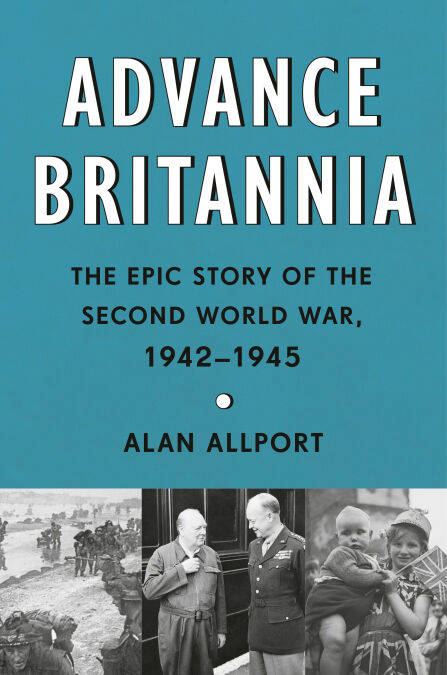
- Retrait gratuit dans votre magasin Club
- 7.000.000 titres dans notre catalogue
- Payer en toute sécurité
- Toujours un magasin près de chez vous
- Retrait gratuit dans votre magasin Club
- 7.000.0000 titres dans notre catalogue
- Payer en toute sécurité
- Toujours un magasin près de chez vous
Advance Britannia EBOOK
The Epic Story of the Second World War, 1942-1945
Alan Allport
Ebook | Anglais
17,96 €
+ 17 points
Description
The author of Britain at Bay—which The Wall Street Journal said may be “the single best examination of British politics, society, and strategy [from 1938 to 1941] that has ever been written”—picks up his sweeping social history in 1942, when what was once a regional war has become an intricate, globe-spanning conflict, with profound consequences for the British Empire and for a British people already exhausted after more than two years of fighting.
“The Japanese, gone berserk, have struck in the Pacific, joined up with the Axis, declared war on us,” one British soldier wrote in his diary. “So the Yanks are now our comrades in arms, and the whole world’s ablaze.”
By 1942, Churchill found himself facing a vastly different war than the one he’d inherited from Neville Chamberlain back in 1940. In the East, the Soviets were now a co-belligerent (if not exactly a firm ally). And the aid he’d so longed for from across the Atlantic had finally arrived, when Pearl Harbor pushed America to end its “dithering and buggering about.” But with Parliament and the public losing faith in him, Churchill had to manage a war that now stretched into the Pacific and Indian Oceans, threatening Britain’s colonies, all the while negotiating a new relationship with Roosevelt and Stalin—two jostling, unpredictable comrades-in-arms fully prepared to carve up the world to their own satisfaction.
In this sequel to his prizewinning Britain at Bay, Alan Allport completes his superlative history of Britain’s role in World War II, once again weaving together the political, military, social, and cultural to tell a multifaceted story of a country forced to endure the profound stresses of total war. Now, Britain is no longer at bay. But any victory remains far off, and its costs will be great. Can the British win the war without sacrificing so much along the way that they then lose the peace?
“The Japanese, gone berserk, have struck in the Pacific, joined up with the Axis, declared war on us,” one British soldier wrote in his diary. “So the Yanks are now our comrades in arms, and the whole world’s ablaze.”
By 1942, Churchill found himself facing a vastly different war than the one he’d inherited from Neville Chamberlain back in 1940. In the East, the Soviets were now a co-belligerent (if not exactly a firm ally). And the aid he’d so longed for from across the Atlantic had finally arrived, when Pearl Harbor pushed America to end its “dithering and buggering about.” But with Parliament and the public losing faith in him, Churchill had to manage a war that now stretched into the Pacific and Indian Oceans, threatening Britain’s colonies, all the while negotiating a new relationship with Roosevelt and Stalin—two jostling, unpredictable comrades-in-arms fully prepared to carve up the world to their own satisfaction.
In this sequel to his prizewinning Britain at Bay, Alan Allport completes his superlative history of Britain’s role in World War II, once again weaving together the political, military, social, and cultural to tell a multifaceted story of a country forced to endure the profound stresses of total war. Now, Britain is no longer at bay. But any victory remains far off, and its costs will be great. Can the British win the war without sacrificing so much along the way that they then lose the peace?
Spécifications
Parties prenantes
- Auteur(s) :
- Editeur:
Contenu
- Nombre de pages :
- 608
- Langue:
- Anglais
Caractéristiques
- EAN:
- 9780451494771
- Date de parution :
- 05-01-26
- Format:
- Ebook
- Protection digitale:
- Adobe DRM
- Format numérique:
- ePub

Les avis
Nous publions uniquement les avis qui respectent les conditions requises. Consultez nos conditions pour les avis.






